#it’s a metaphor Brian
Explore tagged Tumblr posts
Text
𝐐𝐮𝐞𝐞𝐧 𝐦𝐚𝐬𝐭𝐞𝐫𝐥𝐢𝐬𝐭
⊹₊⋆*♫⋆。★*:。ೃ࿔*
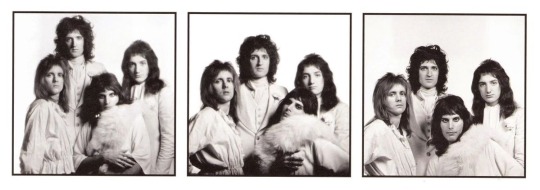
⊹₊⋆*♫⋆。★*:。ೃ࿔*
❝I'm just a musical prostitute, my dear.❞
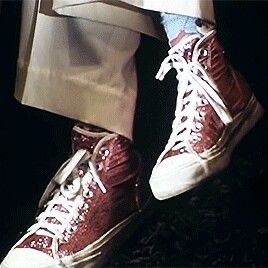


𝐑𝐨𝐠𝐞𝐫 𝐓𝐚𝐲𝐥𝐨𝐫
“Ready Freddie ?”
⚡︎ Nothing yet
⊹₊⋆*♫⋆。★*:。ೃ࿔*

#roger taylor#ben hardy#roger taylor x reader#bohemian rhapsody#borhap#queen band#I’m in love with my car#it’s a metaphor Brian#ben hardy x reader#borhapmasterlist
26 notes
·
View notes
Text
I think Will Graham's problem is that he's constantly surrounded by only 4 groups of people: therapists, serial killers, cops and dogs. No wonder he ended up like That.
#imagine if he at least had 1 friend that was none of the above#who just talked with him normally and without all the pretentious metaphorical bullshit#imagine#will graham#hannibal#text#shitpost#crack#hannibal lecter#hannigram#alana bloom#bedelia du maurier#jack crawford#brian zeller#jimmy price#beverly katz#garret jacob hobbs#abel gideon#tobias budge#matthew brown#francis dolarhyde#mine#crispy
470 notes
·
View notes
Text
today is the official deadline for BDG to become a beekeeper
74 notes
·
View notes
Text
I do think Brian has an incredibly efficient cooling and temperature regulation system because that's a pretty obvious necessity, but every day that drumbot wakes up and does everything he can to overheat himself
#metaphors for overextending oneself despite being disabled? couldn't be me#anyways he plays skyrim in his brain with all the mods and shaders#the crew sticks him in a pool when he does to instantly turn it into a hot tub#the morality everything is an incredibly taxing system on its own just from how many variables it has to consider#less so on mje more so on ejm#drumbot brian#the mechanisms
28 notes
·
View notes
Text
Will Graham being fired from the FBI the SECOND he introduces himself like “oh I do work for the fbi including psychological analysis…….PSYCH!!!! ANAL!!!!!!!”
#hannigram#hannibal nbc#nbc hannibal#hannibal lecter#hannibal#tell me will#will graham#jack crawford#alana bloom#frederick chilton#beverly katz#silence of the lambs#red dragon#francis dolarhyde#the chesapeake ripper#abel gideon#mason verger#hugh dancy#mads mikkelsen#laurence fishburne#brian zeller#jimmy price#hannibal the cannibal#cannibalposting#cannibal aesthetic#cannibalism as a metaphor for love#cannibalism as a form of love#queer sex
124 notes
·
View notes
Text







The Fifth Beatle: The Brian Epstein Story (2012). Vivek J. Tiwary, Andrew C. Robinson (Illustrations).
The Fifth Beatle is the untold true story of Brian Epstein, the visionary manager who discovered and guided The Beatles from their gigs in a tiny cellar in Liverpool to unprecedented international stardom. Yet more than merely the story of "The Man Who Made The Beatles," The Fifth Beatle is an uplifting, tragic, and ultimately inspirational human story about the struggle to overcome seemingly insurmountable odds. Brian himself died painfully lonely at the young age of thirty-two, having helped The Beatles prove through Sergeant Pepper's Lonely Hearts Club Band that pop music could be an inspirational art form. He was homosexual when it was a felony to be so in the United Kingdom, Jewish at a time of anti-Semitism, and from Liverpool when it was considered just a dingy port town.
#the beatles#brian epstein#paul mccartney#george harrison#john lennon#ringo starr#Note: This graphic novel does take /some/ liberties with what's true.#But it is still worth reading.#I especially love the symbolism and metaphors placed.
53 notes
·
View notes
Text
For the characters that weren't meant to be a person. For the characters that were made to be nothing but a plot device or a love interest or a vilian. For the characters that could never be the main characters because they are made to be side characters, they aren't made to be more than their one and only purpose. For the characters that were created for nothing but to serve a narrative. It's like loving children when their parents didn't; it's like seeing their potential when their parents saw nothing but a doll to control.
#parents is a metaphor for the authord#adam young#hazel levesque#simon lotf#drew tanaka#starr carter#calypso pjo#rue thg#rue the hunger games#alix kubdel#frosta#donald duck#aaron o'brien#carol conners#brian (Barton)#chase mclean
38 notes
·
View notes
Text
Juvenile delinquent Jake who’s old crew (tej, suki, and Brian) go down to San Diego for one of those friends and family open Base days. And that is the first time the daggers get to see the real Jake, the Jake who isn’t bidding his time til he gets out of the navy, the Jake who’s entire face lights up when he sees his twin and his best friends. The Jake who’s English goes from well spoken academy grad to sounding like he just rolled out of the garage who’s slinging slang they don’t recognize. Jake who puts his whole soul into doing TikTok dances cause it makes Suki happy to have both of her white boys dancing, trying to throw something back that they don’t have. Him leaning into Tej as they discuss mods for the car Suki is looking at and who grins instead of scowls when Tej messes with his hair. That is the day that the daggers discover that they don’t know Jake, they only know the version he allowed them to see
#I have too many thoughts about this au#about how Jake views the navy#and about how the navy holds Jake’s metaphorical leash#this au consumes me too much#and I don’t have the time to write it how I want to#jake hangman seresin#juvenile delinquent Jake au#still waiting on tumblr to recognize as an actual tag so I don’t have to type it every time#brian oconner#suki fast and furious#tej parker
18 notes
·
View notes
Text

moments of high confidence
10 notes
·
View notes
Note
I’m not too well versed in the comics history, Has there been clear progress made for mutant rights and acceptance in the marvel universe? Like , between the big events and Orchises of the marvel (and real world) setting things back, is there a big difference with how mutants are treated de facto and dejure across the decades since the 60s? Any particular mutant rights milestones?
Great question!
People's History of the Marvel Universe, Week 22: Anti-Mutant Prejudice and Mutant Rights In the Longue Durée
This is a difficult question to answer, because Chris Claremont was very much of the "torture your darlings" school of comics writing, believing that the way to wring endless drama out of your characters was to keep piling tragedy on tragedy on top of them before finally giving them a moment of catharsis. This was especially true for how he handled the mutant metaphor from as far back as X-Men #99, where even when the X-Men saved the day, it would only seem to further fan the flames of anti-mutant prejudice.
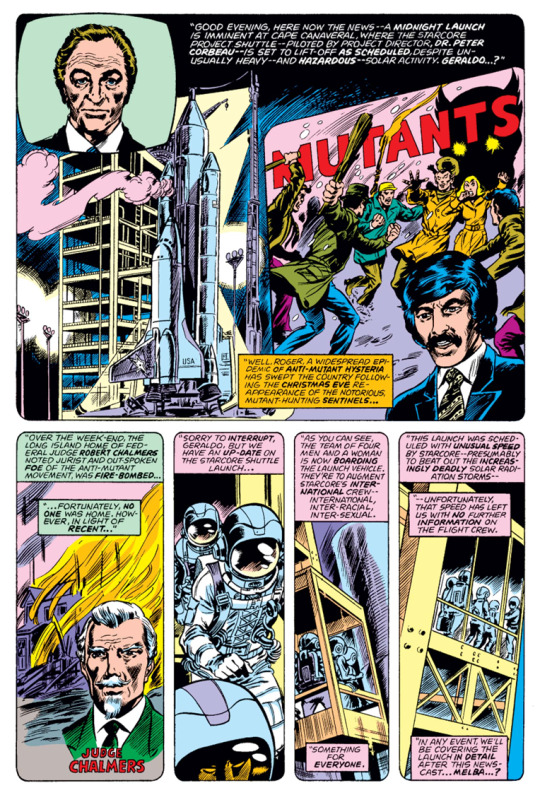
That being said, Claremont didn't present an unchanging portrait of anti-mutant prejudice constantly getting worse and worse - after all, the very beating heart of dramatic structure is variation, without which even the most grimdark tragedy becomes numbing and monotonous. So there are definitely key moments in the Claremont run where the X-Men are able to score a victory for mutantkind.

Perhaps the first and most famous instance of the mutants notching a win comes in the climax of God Loves, Man Kills - Claremont's first great Statement Comic about bigotry. After having foiled the Reverend Stryker's plans to exterminate mutantkind by kidnapping Charles Xavier and using a Cerebro-like device to project lethal strokes into mutant brains across the world, the X-Men confront Stryker on live T.V - again, part of Chris Claremont's endless fascination with the power of media to shape our minds that would recur in Fall of the Mutants - fighting him on the level of ideology and rhetoric. Kitty Pryde is able to bait Stryker into attempted murder in front of the television cameras, ending his crusade of hate:


(I'll do a full in-depth analysis of God Loves, Man Kills and how it both codifies and reveals Chris Claremont's approach to the mutant metaphor in a future issue of PHOMU.)
The next big moment of victory I've already written about in PHOMU Week 20, was Fall of the Mutants. In this storyline, the X-Men face off against Freedom Force and the Registration Act and ultimately sacrifice their lives to save the world in Dallas - once again, using the power of rhetoric and media to strike back against discrimination and oppression.
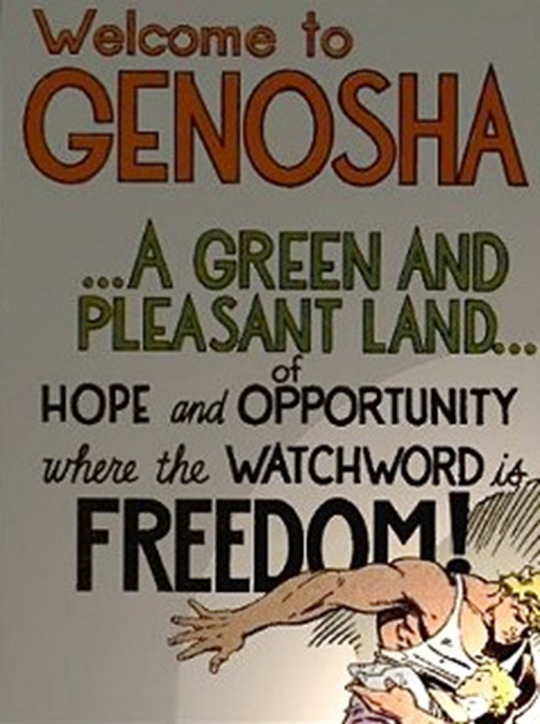
After that, Claremont's next (and arguably last) big victory for mutant rights came in the "Genoshan Saga." (I'll also be doing an in-depth analysis of Genosha in a future issue of PHOMU.) Beginning in UXM #235 and winding its way through Inferno and the X-Tinction Agenda, the fictional nation of Genosha was Chris Claremont's big Statement about apartheid South Africa. An island nation off the east coast of Africa, Genosha seems to be a utopia free of poverty, crime, and disease - but its entire society rests on a foundation of mutant slavery, where mutants are press-ganged, mind-controlled, and genetically-manipulated to serve the human ruling class.
After a series of clashes between the X-Men and the Genoshan Magistrates, the X-Men defeat Genosha's anti-mutant military and their cyborg ally Cameron Hodge. But whereas most superhero comics end with the heroes foiling the evil plan of the supervillain and restoring the status quo, this time Chris Claremont and Louise Simonson went a step beyond the norm and had the X-Men carry out a political revolution that brings lasting structural change - toppling the Genoshan government and abolishing apartheid.
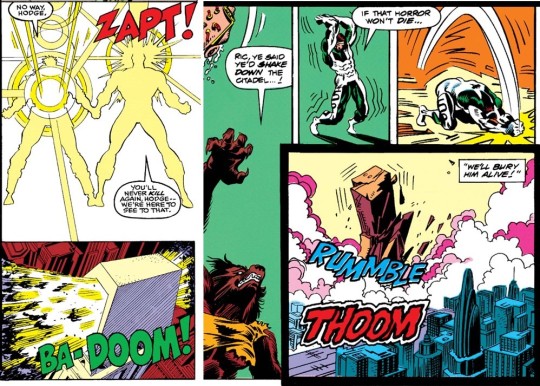
Under the pen of later writers like Joe Pruett, Fabien Nicieza, and (most enduringly) Grant Morrison, the island of Genosha would be refashioned as a mutant homeland, a prosperous and advanced nation of sixteen million mutants ruled by Magneto. (Yet again, a topic for another issue of PHOMU.) Arguably ever since then, the story of the X-Men has been the story of the struggle to restore mutantkind to the position it was in before Cassandra Nova ended the first mutant nation-state, culminating in HOXPOX and the foundation of Krakoa. (A topic we'll be covering next year when FOTHOX/ROTPOX writes the final chapter in the Krakoan Era.)
#xmen#xmen meta#people's history of the marvel universe#the mutant metaphor#chris claremont#the claremont run#grant morrison#brian michael bendis#jonathan hickman#louise simonson
23 notes
·
View notes
Text

This post is not a metaphor :]
(I love that song, this is a BDG appreciation post)))
#my art#artists on tumblr#fanart#doodle#art#original character#sketch#bdg#brian david gilbert#this song is not a metaphor#i really don't like winter king#bdg appreciation post#music#bdg fanart
14 notes
·
View notes
Text
what the fuck do you mean soul brother is about brian may. what do you MEAN freddie mercury wrote a song about brian harold may that went "he's my best friend, he's my champion, and he will rock you, rock you, rock you, cause he's the saviour of the universe, he can make you keep yourself alive, make you keep yourself alive, cause he's somebody, somebody you can love" what do you mean he just wrote that and then casually told brian may about it in the studio one day and was like surprise! i've written a song about you, but it needs your touch! break out that guitar! what do yuo mean they both wrote songs aimed at each other at least once but brian wrote so many for freddie he can't remember which one he was working on at the time. WHAT DO YOU MENA

#queen band#THAT'S SO. THAT'S SO#that's the sweetest fucking thing holy shit they really were besties huh#that's genuinely sooo. cause like i don't think freddie ever wrote songs for any of his other friends!#his lovers sure but as far as i know brian's the only one who got a song dedicated to him#(i mean. he says that he's not sure whether it's actually about him or not but like. why would freddie lie about that?)#'god bless my soul here he comes now / the man with the most how does he do it? / sure he's got style he's so heavy / he's a trip'#'he can do anything anything / cause he's my soul brother'#that's so genuine and sweet and encouraging!!! no flowery metaphors#no poetry or cryptic lyrics#just freddie mercury going I LOVE YOU!! I LOVE YOU!!! YOU'RE MY BEST FRIEND!! YOU'RE SOOO COOL!!! SEE HOW MUCH I LOVE YOU???#for three and a half minutes. it makes me SICK#btw if you tag this as ship it is on SIGHT ok thanks xoxo#and the way most of the queen songs he references were written by brian. godddd#he just wrote that for no reason at all‼️‼️ fucked UP!!!!
45 notes
·
View notes
Text
Not to point out the obvious, but the way the sun is used as a metaphor for happiness consistently throughout the discography just overwhelms me
#you are my earth you are my sun#if you need a little sunshine you can borrow some of mine#when I freeze over you are the sun#like I know it’s a common metaphor but goddamn if it doesn’t land all the same#love is the constant that never changes#it always exists no matter the circumstance#not to overanalyze or anything but I could also do this with the water metaphors and caged birds#both very consistently utilized throughout the discography and I’m obsessed#tfb#the front bottoms#brian sella
9 notes
·
View notes
Text
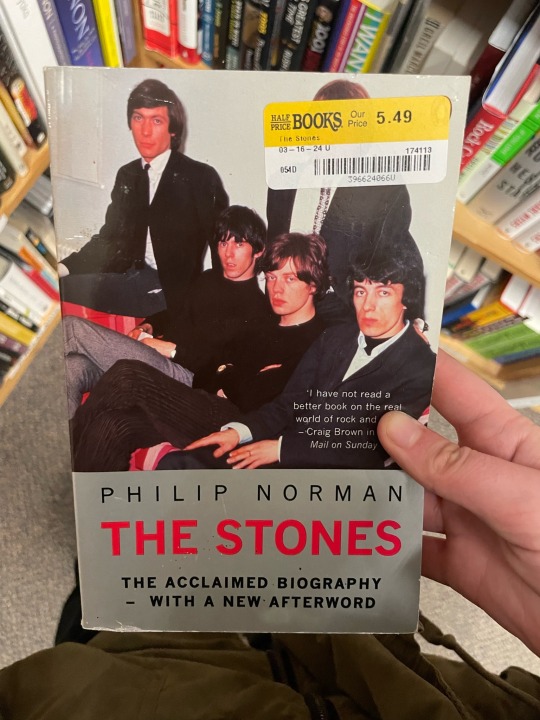
went to the bookstore today to find some stuff to read for a project, and decided to drop by the music section.
I don’t think I could’ve created a more apt metaphor for Brian’s place in the history of The Rolling Stones even if I was paid too.
7 notes
·
View notes
Text
Yall have OCs that are just guys you borrowed from your dreams? Or is that just a me thing?
#genuinely had a dream that was so compelling it manefested 3 seperate guys and a metaphore for parental neglect in my brian#talkies#polls#phucking... ***metaphor***#there is no damn ''e''#misspelt ''brain'' on purpose so no asterisk for that one
2 notes
·
View notes
Text
If we liken a particle's mass to a person's fame, then the Higgs ocean is like the paparazzi: those who are unknown pass through the swarming photographers with ease, but famous politicians and movie stars have to push much harder to reach their destination.⁹
9. I thank Raphael Kasper for pointing out that this description is a variation on the prize-winning metaphor of Professor David Miller, submitted in response to British Science Minister William Waldegrave's challenge in 1993 to the British physics community to explain why taxpayer money should be spent on searching for the Higgs particle.
"The Fabric of the Cosmos" - Brian Greene
#book quotes#the fabric of the cosmos#brian greene#nonfiction#particle#mass#fame#analogy#higgs field#ocean#paparazzi#unknown#swarming#photographers#politicians#movie stars#destination#thanks#raphael kasper#metaphor#david miller#britain#science minister#william waldegrave#challenge#90s#1990s#20th century#physics#taxpayer money
2 notes
·
View notes